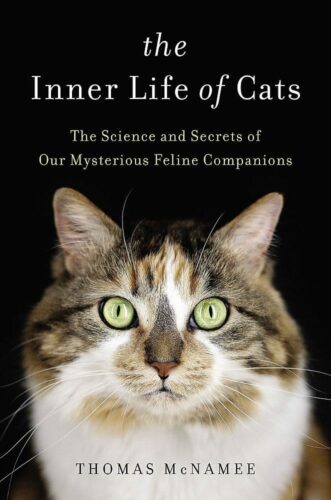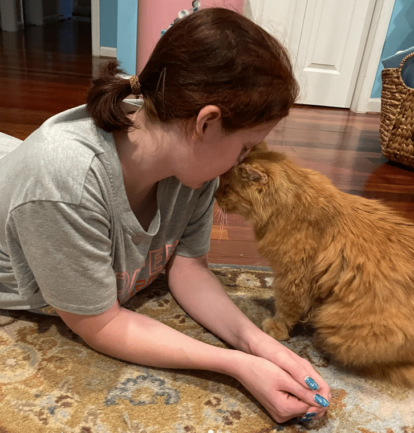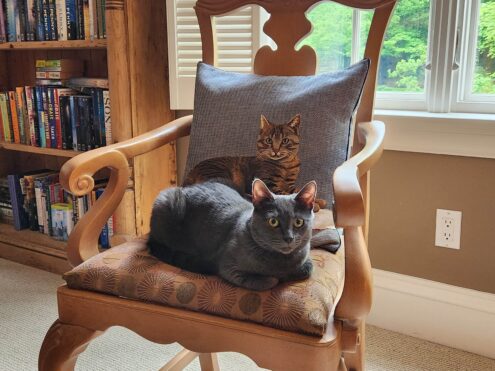 The Story of Augusta
The Story of Augusta
Author: Thomas McNamee
As a feline enthusiast and official crazy cat lady (seriously, I have 8 cats and take care of a feral colony as well), I’m always looking to learn more about what makes our purring pals tick. Enter Thomas McNamee’s The Inner Life of Cats: The Science and Secrets of Our Mysterious Feline Companions. This nonfiction narrative promises to be a more nature-documentary-like examination of cats, something that will leverage research, study, and unbiased scientific evaluation to reveal what cats think and feel.
What The Inner Life of Cats actually is, however, is the story of one of McNamee’s feline companions, the rambunctious and lovable Augusta, interspersed with a few random anecdotes and scientific facts. It reads more like a memoir, with stream of consciousness moments, bits of facts that interest the author, and a request for forgiveness.
The Inner Life of Cats tries, in the beginning, to draw more on its title, to pretend to be scientifically motivated. But soon McNamee introduces Augusta, a lone black kitten that he finds outside his remote home in the snow. The fact that she survived, that she struggled away from whoever abandoned her (and no doubt her littermates) is a testament to the strength of will and determination that will mark the adult Augusta, a cat who loves her free roaming ways and occasionally terrifies her humans by disappearing. Living on the edge of the wilderness, there are endless predators and terrible things that can happen to Augusta, and the recounting of McNamee’s fears and Augusta’s near misses gradually take over the story, pushing the science and some insipid, unrevealing research to the back.
McNamee tries to prove that despite the imminent dangers, Augusta’s indoor/outdoor life is the only way to go. This reads almost as a justification, a plea for understanding that doesn’t quite get us beyond the “but what about that time you took her to that remote cabin with rattlesnakes everywhere – wasn’t that just plain dumb?” McNamee wants to delve into evolutionary science alongside anecdotes of Augusta’s happiness at being outside to justify his stance, one that is increasingly being debated by rescues, who make adopters sign an agreement that their future feline will be indoor only. The rest of the science, well, it’s just not that important or really that cohesive.
By the middle of the book, the science pretense is mostly gone, with the exception of a very detailed and interesting chapter on the issues facing feral cats and the numerous different attempts at population control from the horrifying (city wide endeavors to kill feral populations) to the more acceptable (TNR – Trap, Neuter, Return) efforts. While it’s only one chapter, McNamee does a fantastic job of putting his personal story and experiences aside to look at the statistics and approaches to the growing feral population and why attempts to control it – and make the life of wild cats less horrific – are mostly failing.

Garfield, who came to me as an old, sick feral and trusted me to take care of and love him. Rest in peace my sweet old man.
But then, it’s back to Augusta’s near misses – chapters that have many of us fuming at the author for allowing his precious kitty to face such dangerous circumstances. The science fades away, and after a stop in Rome to talk about their legendary feral populations, we’re watching Augusta’s final decline – death by disease rather than predator. Here, the chapters flow with grief and anguish, something that truly resonates with those of us who have been forced to make decisions for our beloved companions.
It ends with McNamee and his wife getting two new cats adopted, and by then, we have long since realized that this is a memoir, with the occasional factoid and study smashed in. It’s interesting, although horrifying in parts. McNamee doesn’t shy away from gruesome facts and statistics and despite his love for Augusta, he is able to tell these horrible things straight, which makes some of the more emotional among us infinitely sad. It’s an interesting story of a man and his cat, but all in all, he didn’t change my prospective that indoor truly is the best choice and best life for your feline companions nor did he teach me anything I didn’t know about cats. This book isn’t a non-fiction scientific treaty. It’s one man’s story of a cat whom he loved deeply, and it should be marketed openly as such.
– Frances Carden
Follow my reviews on Twitter at: https://twitter.com/xombie_mistress
Follow my reviews on Facebook at: https://www.facebook.com/FrancesReviews
- Book Vs Movie: The Shining - April 6, 2020
- Thankful For Great Cozy Mysteries - December 13, 2019
- Cozy Mysteries for a Perfect Fall - October 20, 2019



